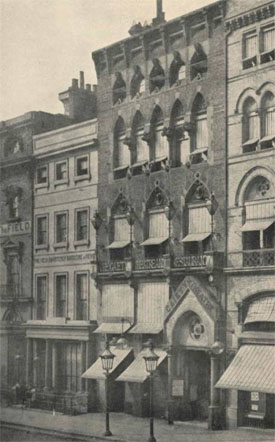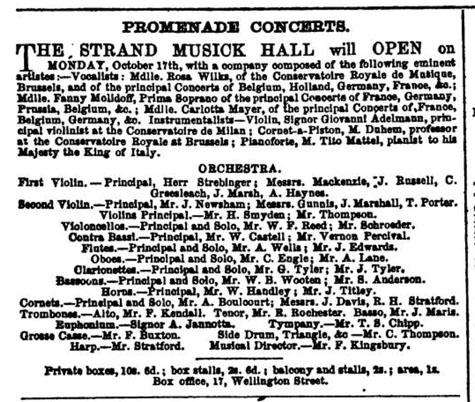1. Genealogical
data for Mr. Handley's family is incomplete and the available
evidence somewhat contradictory. It is fairly clear that his
mother was Harriett Mullen who was born in Brompton, ca. 1803,
the daughter of carpenter James Mullen, and who married John
Handley at St. Mary's, Lambeth, Surrey on May 2, 1827. From
census data it appears that the couple had four children:
Catherine Handley (ca.1831- ), William James Handley
(ca.1832-1896), Selena Charlotte Handley (ca.1834- ), and
Harriett Emma Handley (ca.1836-1902). Subsequently John Handley
died and on January 25, 1838 Harriett married Joseph Thornell,
also at St. Mary's, Lambeth. Joseph was a corporal in the 1st
Regiment Foot Guards, and having also been widowed, had a
daughter, Charlotte Thornell (ca. 1834- ). Harriett and Joseph
had a daughter of their own, Mary Ann Thornell (ca.1849- ) and
the 1841 census lists Harriett Thornell, Cathr. Handley, Selina
C. Handley, Mary Ann Thornhill [
sic], Charlotte Thornhill
[
sic], and Harriett Handley living at the Tower of London
barracks of the 1st Battery Grenadier Guards. William J. Handley
is not included with them, however a William J. Handley, born
ca. 1832, is found living nearby as the son of a William and
Ellen Handley. It is plausible to assume that, after the death
of his father and remarriage of his mother, young William James
was sent to live with a relative, perhaps an uncle. By the 1851
census Harriett Thornell was once more a widow and living in St.
Johns, Westminster with her children William J., now a musician
with the army, Selina, and Harriett Handley, and Mary Ann
Thornell. Later marriage records for his sisters, Harriett and
Selina, however, are contradictory in naming their father. In
her marriage to
Edward
Willis Fletcher (September 9, 1861), Harriett Handley
states that her father's name was
William Handley, a
soldier, whereas Selina Handley in her marriage to Charles
Jenkins (December 23, 1860, witnessed by Harriet Handley),
states that her father was John Handley, also a soldier. It is
certainly possible that, in the four years between the birth of
Selina Handley and her marriage to Joseph Thornell, Harriett
Mullen Handley was also married to a William Handley, but no
record has been found to support that, nor has evidence that her
first husband was named ambiguously John William Handley.
Unfortunately, no record has been found that directly names the
father of William J. Handley, hence it is inferred that he was
the documented John Handley.
(back)
2. Unfortunately the Strand Musick Hall was
closed after only a couple of months. The archaic spelling of
the word "music" was intended to convey a sense that the fare of
the new hall would be of a higher nature than that commonly seen
on the East End variety stages. The Strand Music Hall Company
was incorporated on July 4, 1862 under a memorandum and articles
of association. Money was borrowed for the construction of the
hall and bonds issued to the creditors. In April 1864 an
additional £5000 was borrowed from the Credit Mobilier Company
to be repaid by October 10, 1864. Before that date, however,
Credit Mobilier sold the notes to European and American Finance
Corporation, with whom a new loan agreement. In November the
Strand management posted a notice on the doors of the Musick
Hall blaming "
certain
ill-disposed and mischievous persons" for spreading the
rumor that drinking and smoking would be prohibited, and as a
result it had cost them £500 in lost business in the first
month. Smoking was indeed discouraged in the vicinity of the
balcony "nobility" stalls and the Royal Box, but patrons were
assured that the Hall had a patent system of ventilation
"expressly for fumigatory purposes." In December the
Strand's officers applied for a renewal of the £5000 loan, plus
a further loan of £2700. The humor magazine
Punch (February
11, 1865) wrote that the Strand Musick Company owed "a trifle
of £45000" which was "
punishment
for bad spelling." The Sheriff ordered the Strand
Musick Hall Company into liquidation but the the official
liquidator refused to repay the European and American Finance
Corporation, citing improprieties by the directors of Strand in
securing loans beyond their authorized limit. The Court, noting
the vagaries in the wording of the articles of incorporation and
that the notes were unsigned by the directors of Strand, found
in favor of the Finance Corporation, and ordered the notes
repaid.
(back)
3. This piece was almost certainly written
to be played on natural horn. Clarke wrote a manual on
orchestration in which he expressed his dislike for
valves. In the same year of this composition (1876), a William
James Handley was arrested along with Mr. Robert Sabine on a
charge of "Larceny by Servant and Receiving." Mr. Handley,
apparently the "receiver", was released on his own recognizance
and fined "£20 & one in surety in £20 to appear for
judgement when called upon." Mr. Sabine was apparently the
"servant" who committed the larceny (trafficking in stolen
crooks and mouthpieces perhaps?) for which he was imprisoned for
ten months. Four years earlier in 1871, at the age of thirteen,
he was already serving time as juvenile offender. In 1882
the incorrigible Mr. Sabine was once again given ten months; in
1884, eighteen months plus two years police supervision, and in
1892, three years.
(back)
3. John Winterbottom (1817-1897) was a
composer, conductor, pianist, bassoonist, and entrepreneur. He
began his musical career as a bassoonist in the 1840s in Louis
Antoine Jullien's promenade orchestra. In the early 1850s he
moved to Australia where for several years he catered to the
mixed public of Melbourne and Sydney "by giving promenade
concerts, in close imitation of M. Jullien, to vast audiences,
and with corresponding profit to himself." Upon his return to
London he became known as one of the most skillful bassoon
players in London and the provinces. In addition he was
bandmaster of the Royal Marine Artillery, Portsmouth, a post he
held for twenty-one years until his retirement on March 31,
1892. He then became conductor of the band of the Artists'
Volunteer Corps ("Artist Rifles") of London.
(back)

